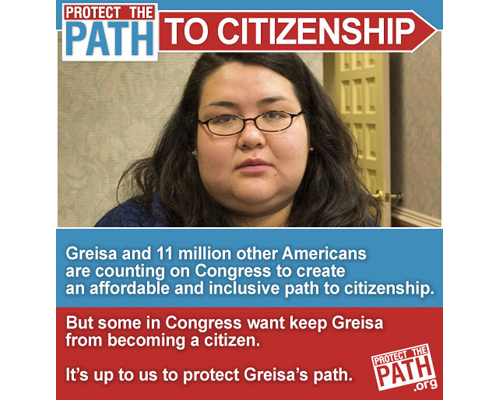 In 2010, NCLR found that 43% of immigrants who have the drive and commitment to become fully naturalized citizens cannot due so simply because they do not have the money for it.
In 2010, NCLR found that 43% of immigrants who have the drive and commitment to become fully naturalized citizens cannot due so simply because they do not have the money for it.
For months, we’ve been fighting for an inclusive pathway to citizenship for the 11 million aspiring Americans currently without documentation. So if we want an inclusive pathway, it needs to be affordable for immigrants like Greisa Martinez and her family. Greisa is a DREAMer from Texas and she, her mom and her sister could all benefit from immigration reform and finally live without fear of being separated. But, there’s one thing that could stand in their way – the cost.
Greisa and her family were financially and emotionally devastated when her father, a Baptist minister, was deported in 2006. Her mother — a stay-at-home mom — began to work at a factory as the family’s sole breadwinner. Greisa was eligible for DACA, but her family’s limited income was going to tuition and they couldn’t afford the $465 fee. But because Greisa is such a leader in her community, generous community members stepped in to help her raise the funds necessary to pay the fee.
However, others may not be so lucky. For any immigration reform to be successful, the pathway to citizenship must be accessible to all who qualify, or else we’ll have an entire group of people continuously stuck in second-class status.
Under current law, all immigration applications are self-funded, meaning all costs are paid for by the applicant without any government aid. The Senate bill has already outlined a series of fees and fines for immigrants to cover, including a $500 fine for undocumented immigrants to pay off the bat, a $500 renewal fee after six years, $1,000 for green cards, and another $595 for citizenship.
These application fees will be prohibitive for families with very limited incomes, families like Greisa’s. With the National Immigration Law Center estimating that more than a quarter of undocumented families make an annual income of under $20,000, many will be forced to delay applications, and others to drop the process altogether.
In fact, the NCLR found that in 2010, of the undocumented immigrants who attended naturalization workshops, 43% either delayed or stopped applications due to ballooning costs. That’s 43% of Americans-in-waiting who have the drive and commitment to become fully naturalized citizens, but cannot due so simply because they do not have the money for it.
Even for smaller families, fees become financially unbearable. In Greisa’s case, her family would need to cover her own fees, her younger sister’s, her mother’s. They also hope to petition for her father’s return to the US. Green card costs for the immediate family would total over $4,000, fees and renewals would total $4000, with another $2,380 added on for citizenship fees. The total cost for Greisa’s family to finally achieve citizenship? Over $10,000. With only her mother’s factory job and so many family expenses, this could put citizenship out of reach.
These numbers only reflect the estimated costs for Greisa’s family as the bill stands — these could easily change as the bill becomes amended for other families.
Immigration reform must be a financial possibility for undocumented Americans. Expensive fines, application fees, and other costs may be appealing to some extreme anti-immigration advocates, but they are roadblocks for the immigrants who simply want to be a part of the American system. Immigration reform has a chance to include everyone, but these high financial bars will only serve to continue leaving people in the shadows.
Immigration reform must be a reality. And in order to make it a reality for all, it must be affordable to all.
Sign our petition to protect the pathway to citizenship here.

